Furman again named a Fulbright Program ‘top producer’
Like many students who major in political science, Brandon Tensley ’12 imagined he would proceed to law school after graduating from Furman. But as a senior who was also studying German, he applied for and was awarded a Fulbright grant to Germany, and things changed.
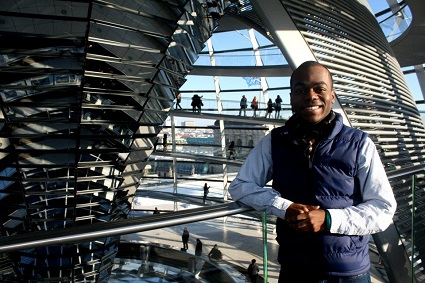
Brandon Tensley ’12 visits the Reichstag in Berlin, Germany.
“Once I was there, I became more interested in how issues of culture and identity, particularly racial identity, play out in a German context,” he said.
The experience as a Fulbright English teaching assistant in Essen, Germany, where he taught students ages 10 through 15, altered Tensley’s entire career trajectory. His interest in multiculturalism and racial identity took him to Oxford, England, where he received a Master of Philosophy in European politics and society in 2015.
Now Tensley, who also served in Thailand as a Luce Scholar, said he carries that “arsenal of experiences” with him as a national political writer for CNN in Washington, D.C. “So even if I’m not living in Germany or Thailand anymore, those experiences are always going to in some way inform the way I think about my work,” he said.
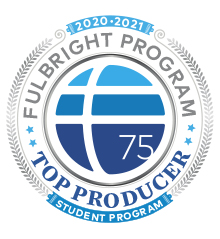
The Top Producer honor comes after six Furman graduates were awarded Fulbright English teaching assistantships last year.
This year, Furman was again named a “top producer” for the Fulbright Program, which was created to increase mutual understanding between the people of the United States and those of other countries. The largest and most diverse international educational exchange program, it is funded by an annual appropriation made by the U.S. Congress to the U.S. Department of State’s Bureau of Educational and Cultural Affairs.
Top producer status is an impressive achievement. But more than another feather in the institutional cap, the real impact of the honor lies in how the Fulbright Program changes lives.
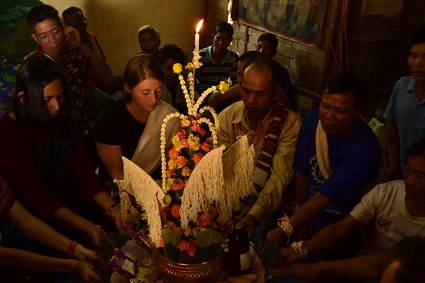
Julia Roberts ’16 (second from left in white shawl) participates in a traditional baci ceremony outside Luang Prabang.
“The Fulbright Program was a chance to really challenge myself and learn to respond to really new, unfamiliar situations and to respond with resilience,” said Julia Roberts ’16, who taught English to university-level students in Laos.
But far from feeling like an outsider, she also learned that she could depend on the warmth and hospitality of the people in Luang Prabang, a UNESCO World Heritage site. She had her moments of homesickness, but those soon evaporated amid the fellowship of her students.
Roberts recalls an occasion when students showed up at her door unexpectedly with a live chicken and a butcher knife. Sparing the meal prep details, Roberts said after the initial shock, she was touched by the gesture and how people tried to fold her into their community.
“Even when you don’t speak the same language very well, you can still come to understand one another and make meaningful memories,” said Roberts, who majored in political science with a poverty studies minor. “You become more accepting, more open-minded, more willing to embrace difference – I think that’s one of the most important things Fulbright does.”
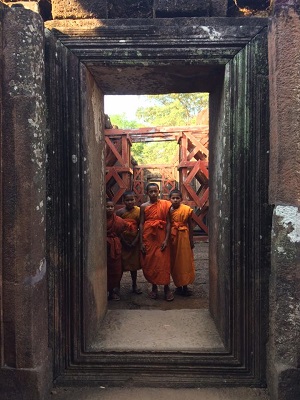
Buddhist novices at Vat Phou in Champasak, Laos. Photo by Julia Roberts ’16.
With her sights set on becoming a professor of anthropology, Roberts is working on her Master of Philosophy in social anthropology at the University of Cambridge, England, via online coursework and anticipates earning her Ph.D.
What excites her most is the prospect of coming full circle – teaching, “doing research that matters,” and bringing study away opportunities to her students.
“That would be such a dream,” said Roberts, who visited 17 foreign countries during her time at Furman, including semesters in Brussels and Southern Africa, a spring break trip with the Cothran Center for Vocational Reflection to Northern Ireland and a three-week May Experience (MayX) to Guatemala.
Overall, when Roberts reflects on her experience in Laos and how it changed her, she’s at a loss for words.
“I don’t even know how to begin to answer the question,” said Roberts. “When you’re living abroad in such a different context, you’re learning every second of the day … There are so many ways to live a human life, and I’d love to facilitate similar learning experiences for my own students one day.”
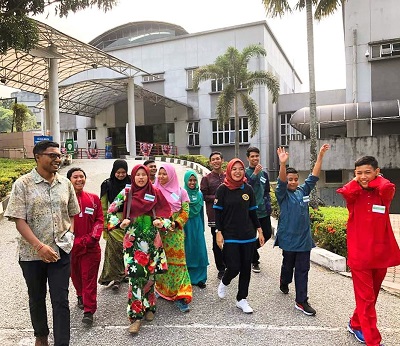
Nathan Mathai ’17 (far left) leads Malaysian students in a tour of a university.
Nathan Mathai ’17, an accounting alumnus who was awarded a Fulbright English teaching assistantship to Malaysia, said he wasn’t ready to dive into the world of CPA exams right away after graduating.
During his senior year job search, he was also getting guidance and feedback on his Fulbright application from Scott Henderson, the William R. Kenan Jr. Professor of Education and director of national and international scholarships director of study away, and other advisers.
Once he started the process, his advisers counseled him every step of the way toward a Fulbright bid, said Mathai, who named more than a half dozen professors who offered input on his essay and application package.
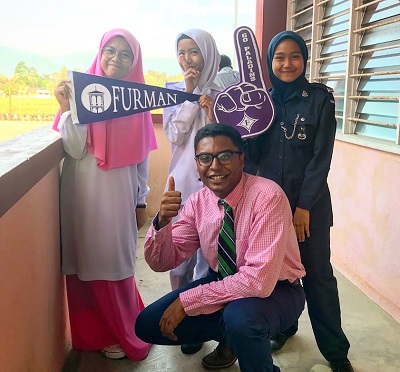
Nathan Mathai ’17 (center) promotes his alma mater on college day.
In Malaysia, he was placed as a teaching assistant for the equivalent of grades 6 through 12 – a role that gave him a crash course in “extreme flexibility.” He worked in the classroom and in the library and led some after-school programs. He learned to determine where he could best support teachers in their efforts to raise English test scores.
Mathai said it was good to see increased passing grades at every level among students at his school in Terengganu. “Getting a passing grade in English in these rural schools is hard,” he said. “But if a few kids can get that, it’s a game changer in their careers.”
He remembered the “great exchange” he developed with students who wanted to learn English. “I would tell them, ‘I’ll say a phrase in Malay, if you say one in English.’”
Mathai came away from Malaysia with a new appreciation for teachers, for lesson planning and the simple beauty of the nation. His hope is that more Furman students will seek Fulbrights or other fellowships, even after graduating.
Mathai stays in touch with his Furman professors and advisers even now in his role as an educational technology consultant with Washington, D.C.-based Accenture. “It’s great to come from a school where professors are invested not just in your educational journey, but also your professional journey,” he said.
No doubt the Fulbright experience changes people and their worldview and even career paths. But being a top producing Fulbright institution has broader significance.
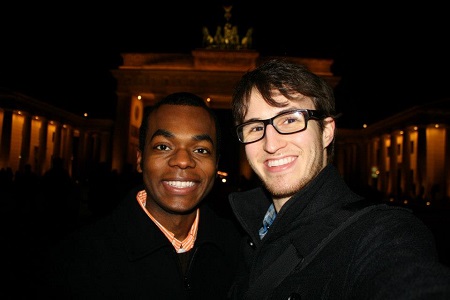
Brandon Tensley ’12 (left) and Rob Sawyer ’11 (right) in front of the Brandenburg Gate, Berlin, Germany.
“It shows that Furman students can successfully compete with the nation’s highest achievers,” said Henderson.
Tensley, whose Fulbright cohort included students from much larger schools, said it’s inspiring for a smaller liberal arts and sciences school to be so well-represented.
“It speaks to the caliber of not just the students, but the dedication of Furman professors,” he said.
“At Furman, my victories felt very much like victories for my professors as well. They’re so fundamental to my love of German language, German culture. I was just happy to be able to represent all the work and attention they put into me and their other students.”